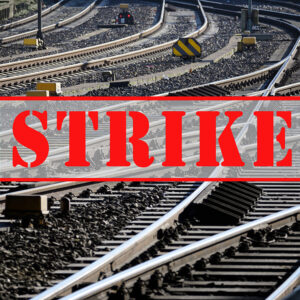Point: The ‘Year of the Strike’ Could Be a Turning Point for the Labor Movement

For an alternate viewpoint, see “Counterpoint: 2023 Won’t Mark a Union Revival, and That’s Good News.”
Picket lines captured headlines in 2023 like no year in recent memory.
In October, U.S. companies lost more workdays to strikes than in any month during the last 40 years. More than half a million American workers left the job this year — and many wound up winning significant concessions.
Big Three auto workers, Hollywood writers and actors, Las Vegas and Los Angeles hotel staff, and Kaiser Permanente healthcare workers will enter the new year with greater economic security, thanks to bargaining table wins. For UPS drivers, the mere threat of a Teamsters strike was enough to secure historic wage hikes and safety protections.
Many New Year’s toasts will celebrate these achievements, and for good reason. Corporate CEOs have gorged on ever more massive paychecks for decades while leaving their workers with crumbs.
But the strikers of 2023 are part of the tiny unionized share of the private sector labor force — which fell to a record low of 6 percent in 2022. If the labor movement can’t make greater inroads in challenging organizing environments, corporations will always have enormous power to pit union and non-union workers against each other in a race to the bottom in wages and benefits.
This point is not lost on unions that scored two of the most significant victories in 2023: the UAW and the Teamsters.
After the UPS win, the Teamsters doubled down on Amazon, picketing outside 25 of the union-busting behemoth’s warehouses. A key demand: a fair contract for unionized drivers for one California-based Amazon delivery service.
UAW leaders — after securing a 25 percent pay hike for their GM, Ford and Stellantis members — sent a message to unorganized auto workers at other companies, urging them to join the union bandwagon.
Top executives at Nissan, Toyota, Honda and Hyundai were also listening. In an apparent attempt to fend off organizing drives, they immediately raised wages for their non-unionized U.S. employees.
These four firms have been part of an investment boom in southern states notorious for anti-union laws and politicians. Expanding worker power in this tough territory will be crucial for the labor movement’s future. In 2023, unions proved it can be done, winning elections at a Blue Bird bus factory in Georgia and AT&T Mobility hubs in Alabama.
The past year also saw union progress in another tough territory: tech. This December, Microsoft signed an agreement to remain neutral in organizing drives among their U.S.-based workers. This will make it easier for 100,000 Microsoft workers to unionize, with potential ripple effects across the industry.
These encouraging signs aside, labor laws still stack the deck in favor of bosses. Just look at the fact that Starbucks and Amazon have been able to get away with refusing to negotiate with workers who voted to unionize well more than a year ago.
Efforts in Congress to strengthen union rights are dead for now, with only two Republicans endorsing the Democrats’ Protecting the Right to Organize Act. On the other hand, President Biden is supporting unions in several ways — and could do more.
In September, Biden became the first American president to join a union picket line. Beyond showing moral support, the White House is using the power of the public purse to boost worker power.
Federal construction contractors now must negotiate project-specific collective bargaining agreements with workers. Biden should require the same of all corporations that get taxpayer-funded contracts and subsidies.
The White House should also demand that all corporations receiving public funds commit to union neutrality and have reasonable gaps between CEO and worker pay. This could make a huge difference since federal contractors employ 25 percent of U.S. workers — and they include Amazon and other corporations known for union-busting and overpaid CEOs.
We might dub this the “year of the strike.” But let’s hope we’ll someday look back at 2023 as more than that — as the year a re-energized movement began reversing its downward slide so that all American workers can get a fair reward for their labor.



